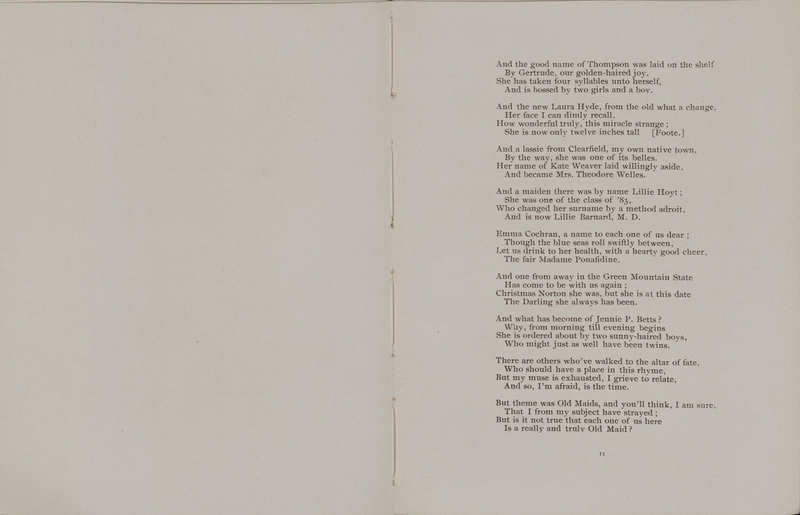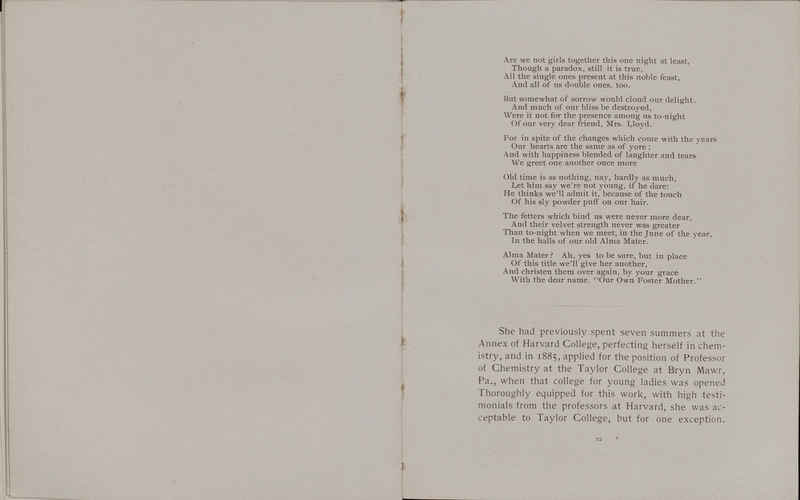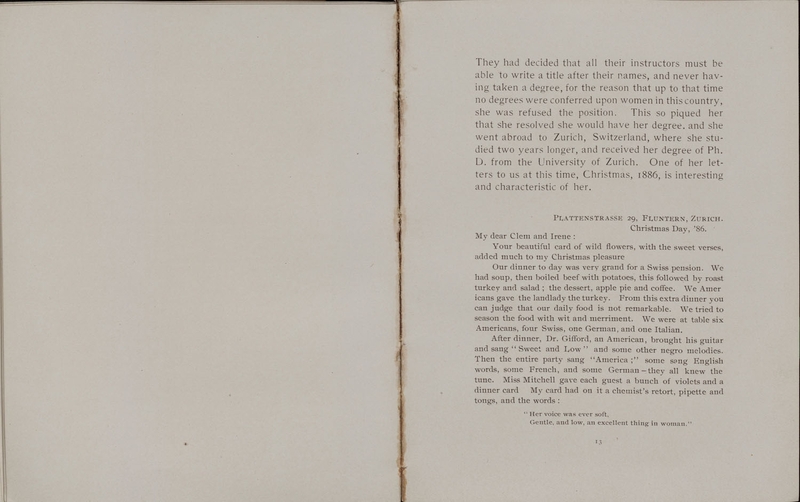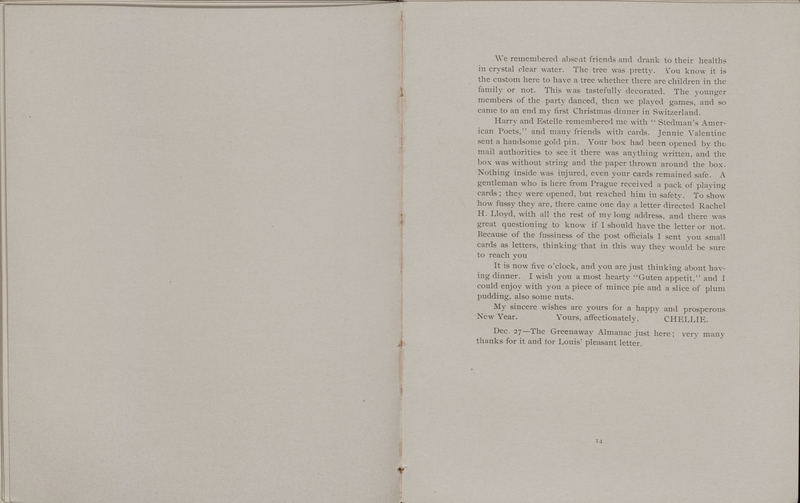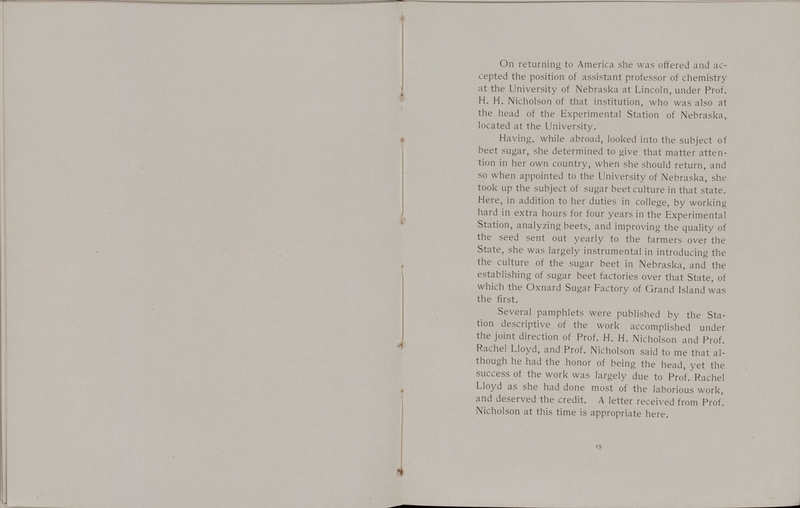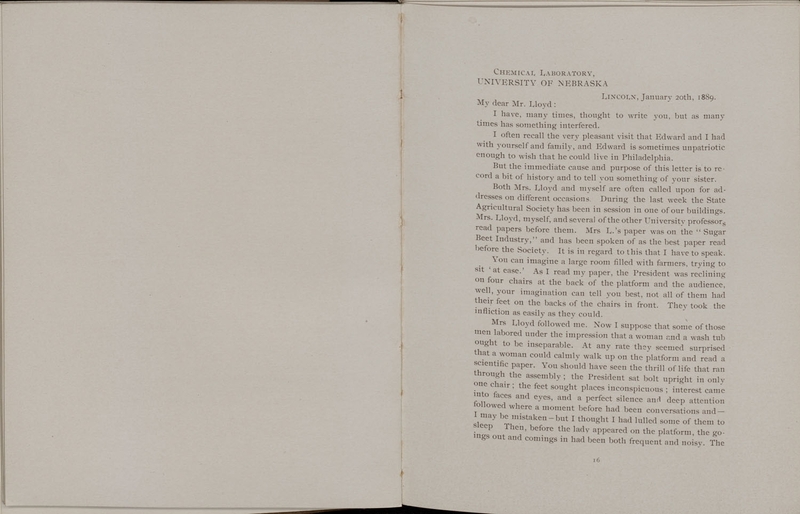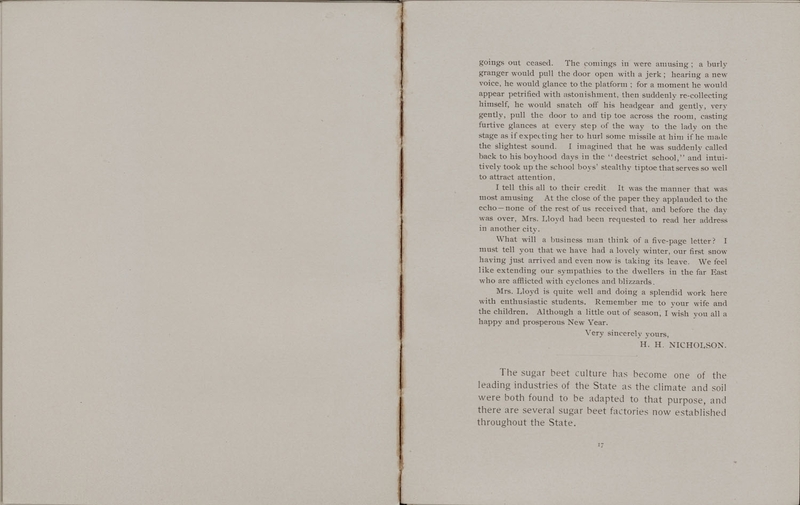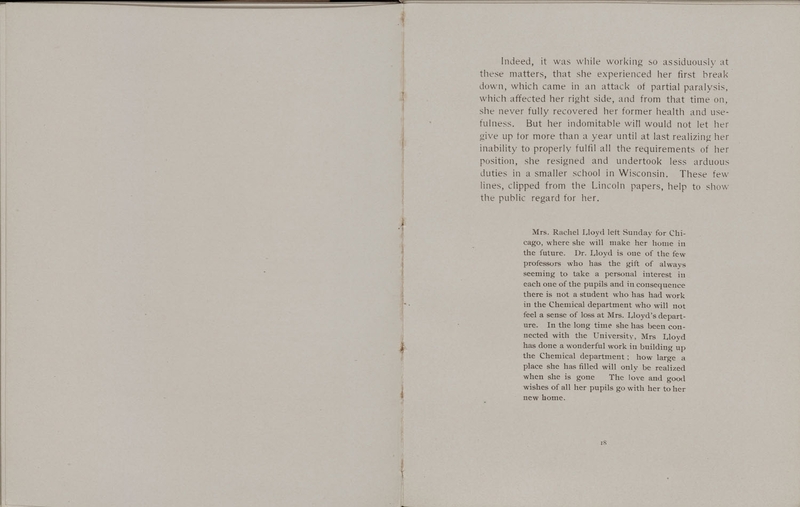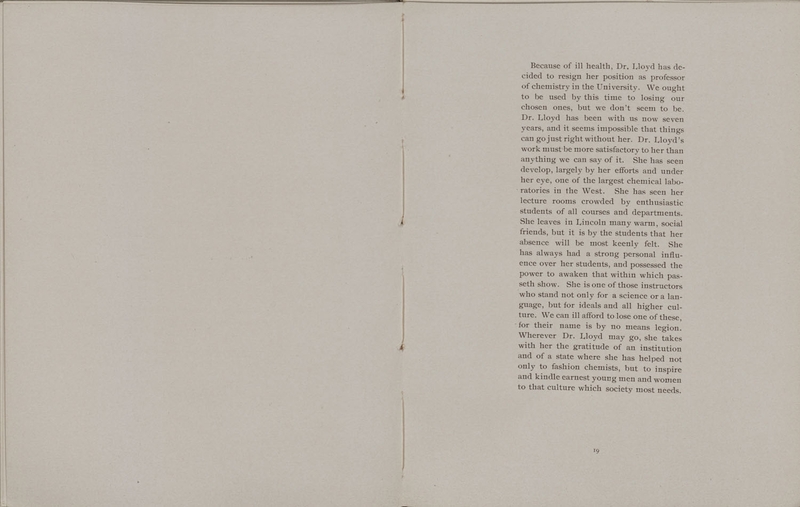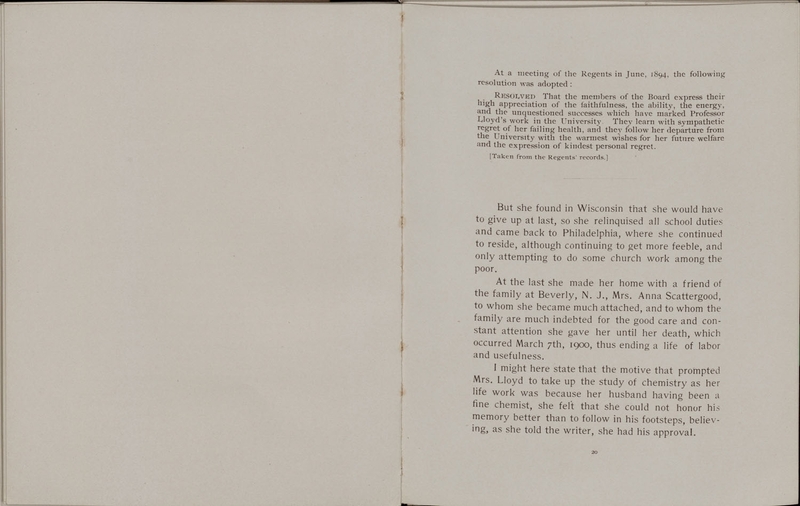And the good name of Thompson was laid on the shelf By Gertrude, our golden-haired joy. She has taken four syllables unto herself, And is bossed by two girls and a boy.
And the new Laura Hyde, from the old what a change, Her face I can dimly recall. How wonderful truly, this miracle strange; She is now ouly twelve inches tall [Foote.]
And a lassie from Clearfield, my own native town, By the way, she was one of its belles. Her name of Kate Weaver laid willingly aside, And became Mrs. Theodore Welles.
And a maiden there was by name Lillie Hoyt; She was one of the class of '83, Who changed her surname by a method adroit, And is now Lillie Barnard, M. D.
Emma Cochran, a name to each one of us dear; Though the blue seas roll swiftly between, Let us drink to her health, with a hearty good cheer, The fair Madame Ponafidine.
And one from away in the Green Mountain State Has come to be with us again; Christmas Norton she was, but she is at this date The Darling she always has been.
And what has become of Jennie P. Betts? Why, from morning till evening begins She is ordered about by two sunny-haired boys, Who might just as well have been twins.
There are others who've walked to the altar of fate, Who should have a place in this rhyme, But my muse is exhausted, I grieve to relate, And so, I'm afraid, is the time.
But theme was Old Maids, aud you'll think, I am sure, That I from my subject have strayed; But is it not true that each one of us here Is a really and truly Old Maid?
Are we not girls together this one night at least, Though a paradox, still it is true, All the single ones present at this noble feast, And all of us double ones, too.
But somewhat of sorrow would cloud our delight. And much of our bliss be destroyed, Were it not for the presence among us to-night Of our very dear friend, Mrs. Lloyd.
For in spite of the changes which come with the years Our hearts are the same as of yore; And with happiness blended of laughter and tears We greet one another once more
Old time is as nothing, nay, hardly as much, Let him say we're not young, if he dare: He thinks we'll admit it, because of the touch Of his sly powder puff on our hair.
The fetters which bind us were never more dear, And their velvet strength never was greater Than to-night when we meet, in the June of the year, In the halls of our old Alma Mater.
Alma Mater? Ah, yes to be sure, but in place Of this title we'll give her another, And christen them over again, by your grace With the dear name. "Our Own Foster Mother."
She had previously spent seven summers at the Annex of Harvard College, perfecting herself in chemistry, and in 1885, applied for the position of Professor of Chemistry at the Taylor College at Bryn Mawr, Pa., when that college for young ladies was opened[.] Thoroughly equipped for this work, with high testimonials from the professors at Harvard, she was acceptable to Taylor College, but for one exception.
They had decided that all their instructors must be able to write a title after their names, and never having taken a degree, for the reason that up to that time no degrees were conferred upon women in this country, she was refused the position. This so piqued her that she resolved she would have her degree, and she went abroad to Zurich, Switzerland, where she studied two years longer, and received her degree of Ph.D. from the University of Zurich. One of her letters to us at this time, Christmas, 1886, is interesting and characteristic of her.
PLATTE~STRASSE 29, FLUNTERN, ZURICH. Christmas Day, '86. My dear Clem and Irene:
Your beautiful card of wild flowers, with the sweet verses, added much to my Christmas pleasure[.]
Our dinner to day was very grand for a Swiss pension. We had soup, then boiled beef with potatoes, this followed by roast turkey and salad; the dessert, apple pie and coffee. We Americans gave the landlady the turkey. From this extra dinner you can judge that our daily food is not remarkable. We tried to season the food with wit and merriment. We were at table six Americans, four Swiss, one German, and one Italian.
After dinner, Dr. Gifford, an American, brought his guitar and sang "Sweet and Low" and some other negro melodies. Then the entire party sang "America;" some sang English words, some French, and some German — they all knew the tune. Miss Mitchell gave each guest a bunch of violets and a dinner card[.] My card had on it a chemist's retort, pipette and tongs, and the words:
"Her voice was ever soft. Gentle. and low, an excellent thing in woman."
We remembered absent friends and drank to their healths in crystal dear water. The tree was pretty. You know it is the custom here to have a tree whether there are children in the family or not. This was tastefully decorated. The younger members of the party danced, thcn we played games, and so came to an end my first Christmas dinner in Switzerland.
Harry and Estelle remembered me with "Stedman's American Poets," and many friends with cards. Jennie Valentine sent a handsome gold pin. Your box had been opened by the mail authorities to see it there was anything written, and the box was without string and the paper thrown around the box. Nothing inside was injured, even your cards remained safe. A gentleman who is here from Prague received a pack of playing cards; they were opened, but reached him in safety. To show how fussy they are, there came one day a letter directed Rachel H. Lloyd, with all the rest of my long address, and there was great questioning to know if I should haye the letter or not. Because of the fussiness of the post officials I sent you small cards as letters, thinking that in this way they would be sure to reach you[.]
It is now five o'clock, and you are just thinking about having dinner. I wish you a most hearty "Guten appetit," and I could enjoy with you a piece of mince pie and a slice of plum pudding, also some nuts.
My sincere wishes are yours for a happy and prosperous New Year.
Yours, affectionately,
CHELLIE.
Dec 27 — The Greenaway Almanac just here; very many thanks for it and for Louis' pleasant letter.
On returning to America she was offered and accepted the position of assistant professor of chemistry at the University of Nebraska at Lincoln, under Prof. H. H. Nicholson of that institution, who was also at the head of the Experimental Station of Nebraska, located at the University.
Having, while abroad, looked into the subject of beet sugar, she determined to give that matter attention in her own country, when she should return, and so when appointed to the University of Nebraska, she took up the subject of sugar beet culture in that state. Here, in addition to her duties in college, by working hard in extra hours for four years in the Experimental Station, analyzing beets, and improving the quality of the seed sent out yearly to the farmers over the State, she was largely instrumental in introducing the the culture of the sugar beet in Nebraska, and the establishing of sugar beet factories over that State, of which the Oxnard Sugar Factory of Grand Island was the first.
Several pamphlets were published by the Station descriptive of the work accomplished under the joint direction of Prof. H. H. Nicholson and Prof. Rachel Lloyd, and Prof. Nicholson said to me that although he had the honor of being the head, yet the success of the work was largely due to Prof. Rachel Lloydas she had done most of the laborious work, and deserved the credit. A letter received from Prof. Nicholson at this time is appropriate here.
Chemical Laboratory, UNIVERSITY OF NEBRASKA Lincoln January 20th, 1889. My dear Mr. Lloyd:
I have, many times, thought to write you, but as many times has something interfered.
I often recall the very pleasant visit that Edward and I had with yourself and family, and Edward is sometimes unpatriotic enough to wish that he could live in Philadelphia.
But the immediate cause and purpose of this letter is to record a bit of history and to tell you something of your sister.
Both Mrs. Lloyd and myself are often called upon for addresses on different occasions. During the last week the State Agricultural Society has been in session in one of our buildings. Mrs. Lloyd, myself, and several of the other University professors read papers before them. Mrs. L's paper was on the "Sugar Beet Industry," and has been spoken of as the best paper read before the Society. It is in regard to this that I have to speak.
You can imagine a large room filled with farmers, trying to sit 'at ease.' As I read my paper, the President was reclining on four chairs at the back of the platform and the audience, well, your imagination can tell you best, not all of them had their feet on the backs of the chairs in front. They took the infliction as easily as they could.
Mrs[.] Lloyd followed me. Now I suppose that some of those men labored under the impression that a woman and a wash tub ought to be inseparable. At any rate they seemed surprised that a woman could calmly walk up on the platform and read a scientific paper. You should have seen the thrill of life that ran through the assembly; the President sat bolt upright in only one chair; the feet sought places inconspicuous; interest came into faces and eyes, and a perfect silence and deep attention followed where a moment before had been conversations and — I may be mistaken — but I thought I had lulled some of them to sleep[.] Then, before the lady appeared on the platform, the goings out and comings in had been both frequent and noisy. The
goings out ceased. The comings in were amusing; a burly granger would pull the door open with a jerk; hearing a new voice, he would glance to the platform; for a moment he would appear petrified with astonishment, then suddenly re-collecting himself, he would snatch off his headgear and gently, very gently, pull the door to and tip toe across the room, casting furtive glances at every step of the way to the lady on the stage as if expecting her to hurl some missile at him if he made the slightest sound. I imagined that he was suddenly called back to his boyhood days in the "deestrict school," and intuitively took up the school boys' stealthy tiptoe that serves so well to attract attention.
I tell this all to their credit. It was the manner that was most amusing. At the close of the paper they applauded to the echo — none of the rest of us received that, and before the day was over, Mrs. Lloyd had been requested to read her address in another city.
What will a business man think of a five-page letter? I must tell you that we have had a lovely winter, our first snow having just arrived and even now is taking its leave. We feel like extending our sympathies to the dwellers in the far East who are afflicted with cyclones and blizzards.
Mrs. Lloyd is quite well and doing a splendid work here with enthusiastic students. Remember me to your wife and the children. Although a little out of season, I wish you all a happy and prosperous New Year.
Very sincerely yours,
H. H. NICHOLSON.
The sugar beet culture has become one of the leading industries of the State as the climate and soil were both found to be adapted to that purpose, and there are several sugar beet factories now established throughout the State.
Indeed, it was while working so assiduously at these matters, that she experienced her first break down, which came in an attack of partial paralysis, which affected her right side, and from that time on, she never fully recovered her former health and usefulness. But her indomitable will would not let her give up for more than a year until at last realizing her inability to properly fulfil all the requirements of her position, she resigned and undertook less arduous duties in a smaller school in Wisconsin. These few lines, clipped from the Lincoln papers, help to show the public regard for her.
Mrs. Rachel Lloyd left Sunday for Chicago, where she will make her home in the future. Dr. Lloyd is one of the few professors who has the gift of always seeming to take a personal interest in each one of the pupils and in consequence there is not a student who has had work in the Chemical department who will not feel a sense of loss at Mrs. Lloyd's departure. In the long time she has been connected with the University, Mrs Lloyd has done a wonderful work in building up the Chemical department; how large a place she has filled will only be realized when she is gone[.] The love and good wishes of all her pupils go with her to her new home.
Because of ill health, Dr. Lloyd has decided to resign her position as professor of chemistry in the University. We ought to be used by this time to losing our chosen ones, but we don't seem to be. Dr. Lloyd has been with us now seven years, and it seems impossible that things can go just right without her. Dr. Lloyd's work must be more satisfactory to her than anything we can say of it. She has seen develop, largely by her efforts and under her eye, one of the largest chemical laboratories in the West. She has seen her lecture rooms crowded by enthusiastic students of all courses and departments. She leaves in Lincoln many warm, social friends, but it is by the students that her absence will be most keenly felt. She has always had a strong personal influence over her students, and possessed the power to awaken that within which passeth show. She is one of those instructors who stand not only for a science or a language, but for ideals and all higher culture. We can ill afford to lose one of these, for their name is by no means legion. Wherever Dr. Lloyd may go, she takes with her the gratitude of an institution and of a state where she has helped not only to fashion chemists, but to inspire and kindle earnest young men and women to that culture which society most needs.
At a meeting of the Regents in June, 1894, the following resolution was adopted:
RESOLVED That the members of the Board express their high appreciation of the faithfulness, the ability, the energy, and the unquestioned successes which have marked Professor Lloyd's work in the University. They learn with sympathetic regret of her failing health, and they follow her departure from the University with the warmest wishes for her future welfare and the expression of kindest personal regret.
[Taken from the Regents' records.]
But she found in Wisconsin that she would have to give up at last, so she relinquised all school duties and came back to Philadelphia, where she continued to reside, although continuing to get more feeble, and only attempting to do some church work among the poor.
At the last she made her home with a friend of the family at Beverly, N. J., Mrs. Anna Scattergood, to whom she became much attached, and to whom the family are much indebted for the good care and constant attention she gave her until her death, which occurred March 7th, 1900, thus ending a life of labor and usefulness.
I might here state that the motive that prompted Mrs. Lloyd to take up the study of chemistry as her life work was because her husband having been a fine chemist, she felt that she could not honor his memory better than to follow in his footsteps, believing, as she told the writer, she had his approval.

